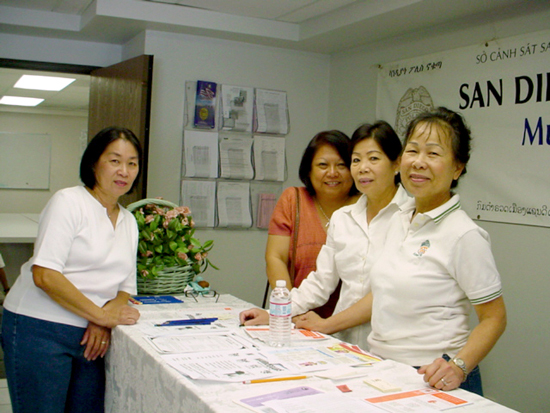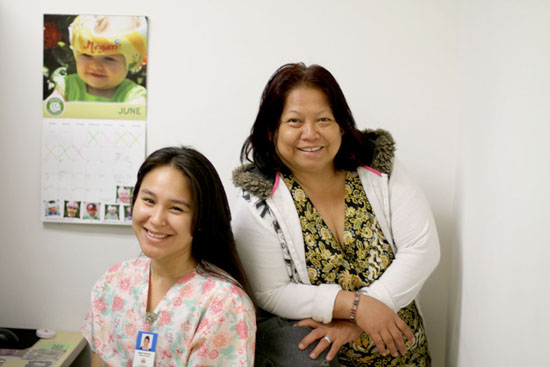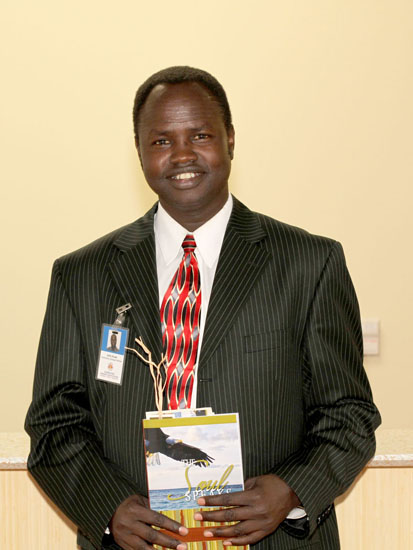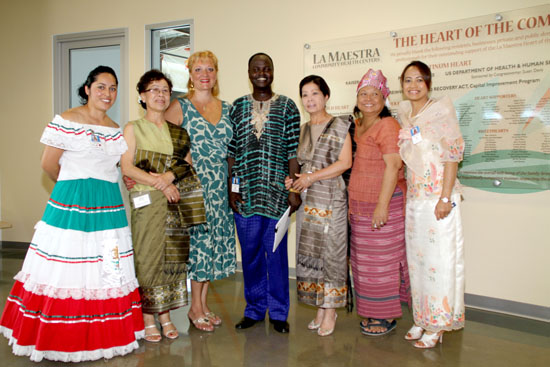Community Health Center: La Maestra Community Health Centers
San Diego, CA | http://www.lamaestra.org/
Contact: Zara Marselian, CEO
If you don’t bother to find out what people believe in and hold sacred,
you can’t deliver an effective service.
– Zara Marselian
Community health centers strive to be responsive to the needs of their patients. By recognizing that behaviors and beliefs are often influenced by culture, language, and social interactions, health centers can better design and deliver services that meet the needs of individuals, families, and their communities. La Maestra Community Health Centers aim to be responsive to their patients’ needs by integrating a Medically Trained Cultural Liaison model into the health services they provide to the ethnically diverse, underserved population of San Diego County.
 Lao and Burmese/Karen cultural liaisons offer information at a health and safety forum for new refugee arrivals
Lao and Burmese/Karen cultural liaisons offer information at a health and safety forum for new refugee arrivals
Source: La Maestra Community Health Centers
The Medically Trained Cultural Liaison model is designed with the core values of cultural humility and linguistic competency in mind. La Maestra’s Cultural Liaisons are their medical assistants, dental assistants, case managers, health educators, medical billing staff, and other relevant staff, who play a dual role in the clinic. In addition to their medical training, they receive 10 hours of core competency training that focuses on community values and culture, leadership styles, and recognizing diversity. Cultural Liaisons come directly from the communities that La Maestra serves. They are often already in leadership roles in their communities, and engaged in community service and other community-based activities. Further, since over 67% of their patients receive care in a language other than English, the Cultural Liaisons contribute to the number of staff members at La Maestra who speak over 26 languages and dialects.

Medical Assistant Nydia and medically trained cultural liaison Myaung, who is from the Karen ethnic group of Burma. She often accompanies new arrivals from their home to the clinic on public transportation.
Source: La Maestra Community Health Centers
Cultural Liaisons support the clinic’s patients through outreach and health promotion, health education, and case management and navigation. They are also an integral part of the care team. Some of their activities are the following:
- Patient support
- Screening at health fairs
- Providing guidance
- Partnerships
- Mobile outreach
Cultural Liaisons also receive training on the basic issues that come up in a health care setting, ranging from confidentiality and safety to general eligibility information about public insurance. Further, they learn to recognize certain medical conditions or signs of severe emergencies and provide assistance on how to access the appropriate care without triaging.
Cultural Liaisons can also play a role in helping clinicians provide a more holistic type of care to their patients. They do this by offering a cultural and social context for the patients’ health beliefs and behaviors. For example, La Maestra visited a hospital and found providing ice chips and resting in bed are seen as the appropriate type of care for pregnant women ready to deliver. Yet through their cultural competency efforts, La Maestra knew that some cultures believe that ice can negatively affect babies and that walking around can be preferred to bed rest. As a result, patients who would not adhere to these hospital protocols were seen as difficult and non-compliant. La Maestra found that Cultural Liaisons were able to effectively explain this cultural difference to providers and find a compromise. Today, they are continually trying to find ways to work with the medical system to understand these different cultural norms and find solutions.
 John Kuek is a cultural liaison from South Sudan. He started as a patient, then became a health educator and job placement coordinator. He went on to get his MFT certification and then achieved a Doctorate in Psychology in March 2013.
John Kuek is a cultural liaison from South Sudan. He started as a patient, then became a health educator and job placement coordinator. He went on to get his MFT certification and then achieved a Doctorate in Psychology in March 2013.
Source: La Maestra Community Health Centers
In 2012, La Maestra served 44,570 patients, and the Cultural Liaisons played an important role in ensuring that barriers related to culture and language did not hinder receiving quality care. Since the Cultural Liaison model is a priority for La Maestra, they have invested organizational funding into financially sustaining it, despite not having a direct funding source. In order to generate more revenue, they are offering an online cultural diversity awareness training to the public. The training curriculum was developed by the La Maestra Foundation, and is based on La Maestra’s knowledge and experience from their Cultural Liaison model.
Finally, La Maestra strives to understand the effectiveness of this model. They do so by evaluating the number of contacts made with patients and continuing to ask the community about their health needs. Through this process, for example, they were able to identify transportation as a challenge and barrier for many of their patients. To address this challenge, they bought minivans and hired drivers to provide services. In fact, the drivers are also Cultural Liaisons, and this gives them another opportunity to foster relationships with their patients.

Liaisons from various countries and cultures dressed in traditional costumes pose with CEO Zara Marselian
at the ribbon cutting for La Maestra’s Gold LEED Certified health center, July 2010.
Source: La Maestra Community Health Centers
By educating La Maestra’s providers and staff about the diverse cultures of their patients, Cultural Liaisons play an important role in ensuring that culture and language do not present barriers for underserved populations in accessing health care and other support services. The key to the effectiveness of La Maestra’s Medically Trained Cultural Liaison model has been ensuring that their staff represents the populations they serve, so they can act as conduits between their communities and La Maestra. Moreover, La Maestra Community Health Centers listen to and learn from the community in order to provide quality, comprehensive health services that respect the dignity and cultural context of their patients.
